Sources
- At Last the 1948 Show. With Tim Brooke-Taylor, Graham Chapman, John Cleese, Marty Feldman, and Aimi MacDonald. El Records, 2007.
Retrieved from The Four Sydney Lotterbies
"The Minister Who Falls to Pieces", also known as "The Minister Who Falls Apart" and "The Disintegrating Minister," was a surreal British comedy sketch. Though it was first heard on radio in a 1966 episode of I'm Sorry, I'll Read That Again , with John Cleese as the titular minister and David Hatch as the interviewer, it is probably best known in the version performed on television by Tim Brooke-Taylor and Graham Chapman in 1967 on At Last the 1948 Show . The sketch can be heard on the original soundtrack album of At Last the 1948 Show, which has been transferred to CD. Video of the sketch does exist and has circulated but is not at present commercially available.
As heard on the soundtrack, "The Minister Who Falls to Pieces" takes the form of a TV news interview. Brooke-Taylor, playing the interviewer, welcomes Chapman, as "the Minister of Fuel, Mr. James Pemberton," to the "studio." As Chapman (speaking with a faintly Scottish accent and in a somewhat crotchety tone of voice), begins to answer Brooke-Taylor's first question, a clanging sound, as of a metal object hitting the floor, is heard (to giggles from the show's actual studio audience). "Good heavens," Chapman remarks. "My foot's dropped off." "It's gone to sleep," says Brooke-Taylor. "No, it's dropped off," reiterates Chapman. "It's fallen on the floor -- look. There it is under the table. It fell off!" A startled Brooke-Taylor attempts to continue with his questions but is continually interrupted by Chapman's cries (and more clanging) as he keeps losing body parts ("There goes the other one -- my feet have dropped off, both of them!...Oh, my thigh! My thigh's fallen off!") Brooke-Taylor becomes increasingly rattled and Chapman increasingly distracted by his own singular predicament ("I'm falling to pieces! Help!"); the interview itself falls apart and finally ends with Brooke-Taylor bidding Chapman, or what is left of him, goodnight.
The sketch's humour can be called typically British because of its understated character (note the deadpan tone in which Chapman first announces he is falling apart) and because the interviewer attempts so valiantly and yet in vain to put a good face on an impossible situation. (The British are often said to be inordinately concerned with decorum and surface appearances.) Brooke-Taylor's role becomes more and more comically hapless, not only as Chapman's Minister continues to disintegrate but also as the "live" in-studio audience is heard to laugh louder and harder as the sketch becomes ever more absurd.
Retrieved from The Four Sydney Lotterbies

Graham Chapman was a British actor, comedian and writer. He was one of the six members of the surreal comedy group Monty Python. He portrayed authority figures such as The Colonel and the lead role in two Python films, Monty Python and the Holy Grail (1975) and Life of Brian (1979).

John Marwood Cleese is an English actor, comedian, screenwriter, and producer. Emerging from the Cambridge Footlights in the 1960s, he first achieved success at the Edinburgh Festival Fringe and as a scriptwriter and performer on The Frost Report. In the late 1960s, he cofounded Monty Python, the comedy troupe responsible for the sketch show Monty Python's Flying Circus. Along with his Python costars Terry Gilliam, Eric Idle, Terry Jones, Michael Palin, and Graham Chapman, Cleese starred in Monty Python films, which include Monty Python and the Holy Grail (1975), Life of Brian (1979), and The Meaning of Life (1983).

The "Dead Parrot Sketch", alternatively and originally known as the "Pet Shop Sketch" or "Parrot Sketch", is a sketch from Monty Python's Flying Circus about a non-existent species of parrot, called a "Norwegian Blue". A satire on poor customer service, it was written by John Cleese and Graham Chapman and initially performed in the show's first series, in the eighth episode.

The Goodies were a trio of British comedians: Tim Brooke-Taylor, Graeme Garden and Bill Oddie. The trio created, wrote for and performed in their eponymous television comedy show from 1970 until 1982, combining sketches and situation comedy.
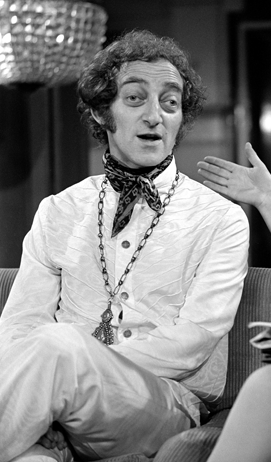
Martin Alan Feldman was a British actor, comedian and comedy writer. He was known for his prominent, misaligned eyes.
I'm Sorry, I'll Read That Again was a BBC radio comedy programme that was developed from the 1964 Cambridge University Footlights revue, Cambridge Circus., as a scripted sketch show. It had a devoted youth following, with the live tapings enjoying very lively audiences, particularly when familiar themes and characters were repeated; a tradition that continued into the spinoff show I'm Sorry I Haven't a Clue.

Timothy Julian Brooke-Taylor OBE was an English comedian and actor, best known as a member of The Goodies.

At Last the 1948 Show is a satirical television show made by David Frost's company, Paradine Productions, in association with Rediffusion London. Transmitted on Britain's ITV network in 1967, it brought Cambridge Footlights humour to a broader audience.

And Now for Something Completely Different is a 1971 British sketch comedy film based on the television comedy series Monty Python's Flying Circus featuring sketches from the show's first two series. The title was taken from a catchphrase used in the television show.
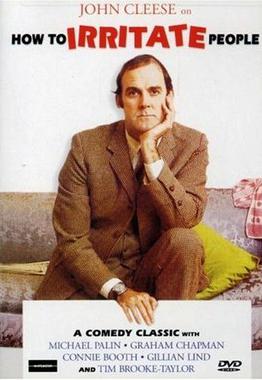
How to Irritate People is a US television broadcast filmed in the UK at LWT on 14 November 1968 and written by John Cleese, Graham Chapman, Marty Feldman and Tim Brooke-Taylor. Cleese, Chapman, and Brooke-Taylor also feature in it, along with future Monty Python collaborators Michael Palin and Connie Booth.

The "Four Yorkshiremen" is a comedy sketch that parodies nostalgic conversations about humble beginnings or difficult childhoods. It features four men from Yorkshire who reminisce about their upbringing. As the conversation progresses they try to outdo one another, and their accounts of deprived childhoods become increasingly absurd.
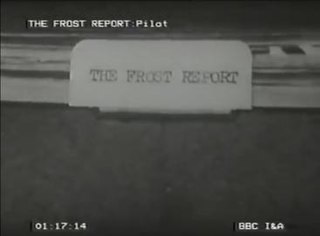
The Frost Report is a satirical television show hosted by David Frost. It introduced John Cleese, Ronnie Barker, and Ronnie Corbett to television, and launched the careers of other writers and performers. It premiered on BBC1 on 10 March 1966 and ended on 12 December 1967, with a total of 26 regular episodes over the course of 2 series and 2 specials as well.
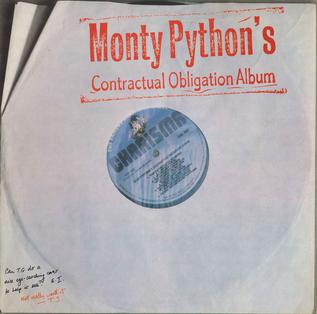
Monty Python's Contractual Obligation Album is the final studio album by Monty Python, released in 1980. As the title suggests, the album was put together to complete a contract with Charisma Records. Besides newly written songs and sketches, the sessions saw re-recordings of material that dated back to the 1960s pre-Python shows I'm Sorry, I'll Read That Again, The Frost Report, At Last The 1948 Show and How To Irritate People. One track, "Bells", dates from the sessions for Monty Python's Previous Record, while further material was adapted from Eric Idle's post-Python series Rutland Weekend Television. The group also reworked material written but discarded from early drafts of Life Of Brian, as well as the initial scripts for what would eventually become The Meaning Of Life.
The Undertakers sketch is a comedy sketch from the 26th episode of Monty Python's Flying Circus, entitled "Royal Episode 13". It was the final sketch of the thirteenth and final episode of the second season, and was perhaps the most notorious of the Python team's television sketches.
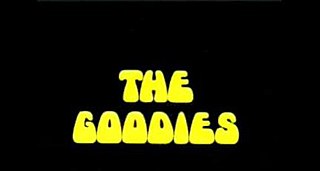
The Goodies is a British television comedy series shown in the 1970s and early 1980s. The series, which combines surreal sketches and situation comedy, was broadcast by the BBC, initially on BBC2 but soon repeated on BBC1, from 1970 to 1980. One seven-episode series was made for ITV company LWT and shown in 1981–82.
The Secret Policeman's Other Ball was the fourth of the benefit shows staged by the British Section of Amnesty International to raise funds for its research and campaign work in the human rights field. It was the second of many shows to bear the celebrated "Secret Policeman's" title that became the iconic series known informally as The Secret Policeman's Balls.
Sydney Warren Lotterby OBE was a British television producer and director who produced numerous BBC comedy series.
The Cambridge Footlights Revue is an annual revue by the Footlights Club, a group of comedy writer-performers at the University of Cambridge. Three of the more notable revues are detailed below.
"The Four Sydney Lotterbies" is a British comedy sketch performed on an episode of the 1967-1968 sketch comedy TV series At Last the 1948 Show. The four main actors in the sketch were John Cleese, Marty Feldman, Tim Brooke-Taylor, and Graham Chapman, each of whom had a hand in writing the dialogue. The sketch was named for Cleese's associate, the television producer and director Sydney Lotterby. "The Four Sydney Lotterbies" is one of the relatively few 1948 Show sketches that today survive in video as well as in audio format. The sketch can be seen on the DVD compilation of the series and heard on its original soundtrack album, which has been released on CD.
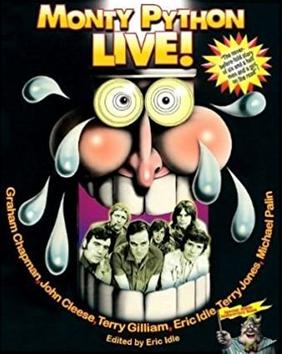
Monty Python Live! is a book detailing the various live performances of the Monty Python team between 1971 and 1980.